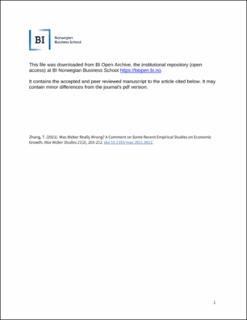| dc.contributor.author | Zhang, Tong | |
| dc.date.accessioned | 2023-07-11T09:07:28Z | |
| dc.date.available | 2023-07-11T09:07:28Z | |
| dc.date.created | 2021-09-20T12:54:11Z | |
| dc.date.issued | 2021 | |
| dc.identifier.citation | Max Weber Studies. 2021, 21 (2), 203-212. | en_US |
| dc.identifier.issn | 1470-8078 | |
| dc.identifier.uri | https://hdl.handle.net/11250/3077565 | |
| dc.description.abstract | In the last two decades, there have been two influential papers in empirical economic growth, Becker and Woessmann (2009) and Acemoglu, Johnson, and Robinson (2001), which explicitly or implicitly claim that Weber's thesis has been refuted by empirical evidence. This paper argues that their alleged refutation of Weber is achieved by serious distortions and reductions of Weber's thesis combined with a sequence of unsubstantiated extrapolations. | en_US |
| dc.language.iso | eng | en_US |
| dc.publisher | Project Muse | en_US |
| dc.relation.uri | https://www.jstor.org/stable/10.15543/maxweberstudies.21.2.203?refreqid=excelsior%3A3dd3543bf4b2bdfb2fcf567e6dfa97a2 | |
| dc.rights | Attribution-NonCommercial-NoDerivatives 4.0 Internasjonal | * |
| dc.rights.uri | http://creativecommons.org/licenses/by-nc-nd/4.0/deed.no | * |
| dc.title | Was Weber Really Wrong? A Comment on Some Recent Empirical Studies on Economic Growth | en_US |
| dc.type | Journal article | en_US |
| dc.description.version | acceptedVersion | en_US |
| dc.source.pagenumber | 203-212 | en_US |
| dc.source.volume | 21 | en_US |
| dc.source.journal | Max Weber Studies | en_US |
| dc.source.issue | 2 | en_US |
| dc.identifier.doi | 10.15543/maxweberstudies.21.2.203 | |
| dc.identifier.cristin | 1935989 | |
| cristin.ispublished | true | |
| cristin.fulltext | postprint | |

